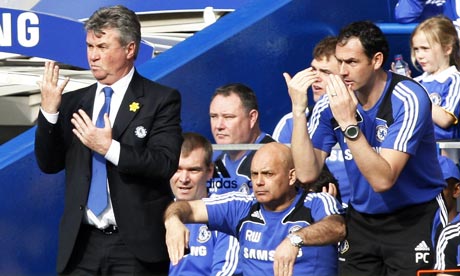
Guus Hiddink marked his return to Russia as the country's national coach yesterday by pouring cold water on any suggestion that he can be persuaded to continue as Chelsea's manager next season.
Hiddink, more popular in Russia than the prime minister, Vladimir Putin, conceded that there has been a concerted campaign to keep him at Chelsea but described his much-affirmed decision to leave in May as "categorical" and said his future would only be decided in November, at the end of the World Cup qualifying campaign.
Asked whether there had been pressure to continue at Stamford Bridge, he said: "That's true. A lot of people are trying to persuade me to stay at Chelsea. But I won't change my decision. I'm leaving Chelsea in May."
Hiddink added that he hopes to see Chelsea through to the Champions League final at the end of May. He made clear that his long-term future as the national coach depends on whether Russia can overcome Germany in their World Cup qualifier in Moscow on 10 October or, if they finish second in the group, win a play-off in November to reach South Africa in 2010.
"We will do everything, and even more, to qualify for the World Cup," he said. "But, if not, the Russian Football Union would surely want to elaborate a new strategy for the development of football in the country. And in that case they'll need another man, not me. If this happens I'm ready to leave in November. Or decide whether we will work together in the future or not. This is the talk we had. It doesn't have any relation with Chelsea."
Hiddink flew back to Moscow on Tuesday ahead of Russia's World Cup qualifiers against Azerbaijan on Saturday and Liechtenstein the following Wednesday. He held a training session yesterday with the Russian squad in freezing temperatures at the city's Luzhniki Stadium. Asked again about whether he might be tempted to stay in London, he said: "Let's forget about Chelsea for this week."
The Dutchman also praised Andrey Arshavin, describing him as integral to the Russian national side. Arshavin has adapted rapidly to the physical and mental demands of the Premier League with Arsenal, and Hiddink said. "He's adapted very well. He's a capable player and a beautiful role model for young players in Russia."
Russian observers say the only possibility of Hiddink extending his tenure at Chelsea depends on a complex series of factors. These include the internal dynamics of Russia's football association and, of paramount importance, the wishes of the Kremlin – for whom Hiddink has been the key to unlocking Russia's footballing glory.
Most commentators within Russia believe Roman Abramovich is unlikely to try to keep Hiddink at Stamford Bridge if this conflicts with what the Russian government wants. The Chelsea owner and other nervous oligarchs know instinctively that the quickest way to be deprived of their billions is to go against the wishes of the Kremlin, especially over questions of national prestige.
"Abramovich understands that here in Russia he will be very unpopular if he keeps Hiddink at Chelsea. Maybe he understands it would be better to find someone else like Frank Rijkaard for a long-term relationship with the club," Anton Lisin, a writer and columnist with the Sovietsky Sport, told the Guardian.
"But in London everyone wants him to stay. If you look at the football forums on the internet they are all calling for him to carry on. Abramovich may end up being the victim in this, and of his decision to bring Hiddink to Chelsea. In the end he has to decide."
Currently, Abramovich pays for Hiddink's $8m-a-year (£5.4m) salary as Russian national coach, and also underwrites the national football academy, and other major projects. This may change if Vitaly Mutko, the current head of Russia's FA, vacates the job in May. One of Mutko's possible successors is Sergei Fursenko, the president of Zenit St Petersburg, who are backed by the Russian state energy giant Gazprom. If Fursenko takes over, backed by Gazprom, Abramovich may reconsider his role as banker to the national team.
Yesterday, Hiddink gave the distinct impression he was relieved to be away from Stamford Bridge. "I'm very happy to be back here with the squad," Hiddink said. "But the most important thing is Azerbaijan on Saturday."
Chelsea's chief executive, Peter Kenyon, meanwhile, has refused to comment on rumours linking the club with a move for Milan's head coach, Carlo Ancelotti, during the summer. Ancelotti triggered fresh speculation by hinting he is unlikely to remain at San Siro indefinitely.
Kenyon said: "I don't want to comment. We are concentrating on Guus being with us until the end of the season. The whole agreement was for a short-term, interim period and that is how it remains."

